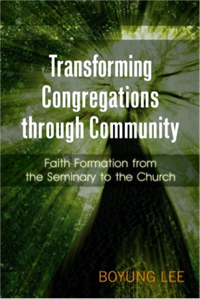
DARREN CRONSHAW reads Boyung Lee’s Transforming Congregations through Community: Faith Formation from the Seminary to the Church…
Boyung Lee
Transforming Congregations through Community: Faith Formation from the Seminary to the Church
Westminster John Knox Press, Louisville, Kentucky, US, 2013.
ISBN-13: 978-0664233303

“In reading about the Hebrew Bible’s ‘people of God’ and the New Testament’s ‘body of Christ’, she sees a liberating vision of community that rejects both radical individualism and oppressive group conformity.”
It is easy for local churches to measure growth in attendance, budget and programs, but more elusive to foster and measure growth in faith formation. It is even more challenging to evaluate how churches help people grow in communal awareness, intercultural intelligence and liberating reading of Scripture. It is easy to espouse a commitment to developing mature and globally-interested faith, but another thing to develop workable strategies for doing it in the complexities of congregational and seminary life.
Thus I welcome Transforming Congregations through Community by Boyung Lee, the associate professor of practical theology, education and spiritual formation at Pacific School of Religion in Berkeley, California. Lee draws on her expertise as an Asian American postcolonial feminist religious educator and unpacks transformative academic perspectives on faith formation.
I especially appreciated Lee exploring the work of Maria Harris (who argues churches do not have a curriculum, they are the curriculum) applying postcolonial hermeneutics to church Bible studies. The value of the book, however, lies not just in its academic breadth and depth, but its grounding in the realities of congregational life. Aptly subtitled Faith Formation from the Seminary to the Church, Lee explores the dynamics of faith formation in seminary and church teaching, and draws on seminary experience and academic research that serves church ministry contexts.
In part one, Lee explores a Biblical call for communal faith. She boldly suggests that individualism is the fundamental problem in society as well as theological education and churches. In the growing popularity of small groups, she identifies the characteristics of “me-first” religion and a collectivism of Western individuals who merely share similar needs and interests. She advocates instead a pedagogical model of communal ministry. Lee suggests Western churches could learn from the communal patterns of other cultural groups, yet she is also critical of their tendency towards hierarchy and patriarchy. In reading about the Hebrew Bible’s ‘people of God’ and the New Testament’s ‘body of Christ’, she sees a liberating vision of community that rejects both radical individualism and oppressive group conformity.
Part two presents a pedagogy of communal faith with a refreshingly high view of Christian religious education. Drawing on Maria Harris, Lee advocates moving from schooling that is classroom-focused to education that forms people holistically and occurs in everything we do – worship and mission as well as formal teaching. She unpacks how to see the whole of church life as curriculum; to identify the explicit, implicit and null curricula; and to include social transformation learning goals alongside other aspects of theological knowledge: “Education is concerned with people’s whole being, and thus it is so much more than solely learning about new information and traditions in classrooms. Similarly, Christian education seeks to help people be in right relationship with God through Jesus Christ, and to incarnate that relationship in their lives, in addition to gaining biblical and theological knowledge … with the pursuit of justice, that is, how one practises justice and mercy and love.”
Part three focuses on pedagogical praxis for communal faith formation with methods and examples from church life. Lee models using postcolonial Biblical hermeneutics in accessible ways – paying attention to voices from the margins and identifying the influence of imperialism. She offers a ‘5 Rs model’ of reading Scripture that bridges the Biblical world with our world and its issues – readying the ground, remembering, reflecting, reinterpreting and re-searching. She discusses vision-development that encourages church departments to move from fragmentation to synergising together. She advocates moving from multiculturalism to intercultural ministry with its ‘liberating interdependence’. My favourite chapter was about the ‘travelling Bible study’ where Lee led a church through a liberating reading of the Lord’s Prayer, connecting the Biblical story and a world-embracing reading of the prayer with the congregation’s personal stories and life experiences.
The book’s most valuable contribution may be to help lift the bar on Christian education and especially its liberating, intercultural and whole congregational potential. Each chapter concludes with exercises and discussion topics for small group application. But it is an especially valuable resource of academic and practical depth for congregational leaders or educators – from Sunday School teachers to seminary professors.
This review was originally published in Religious Education: The official journal of the Religious Education Association (2016), published online (11 July 2016), DOI: 10.1080/00344087.2016.1104225.
To buy this book, follow this link – Transforming Congregations through Community: Faith Formation from the Seminary to the Church.





